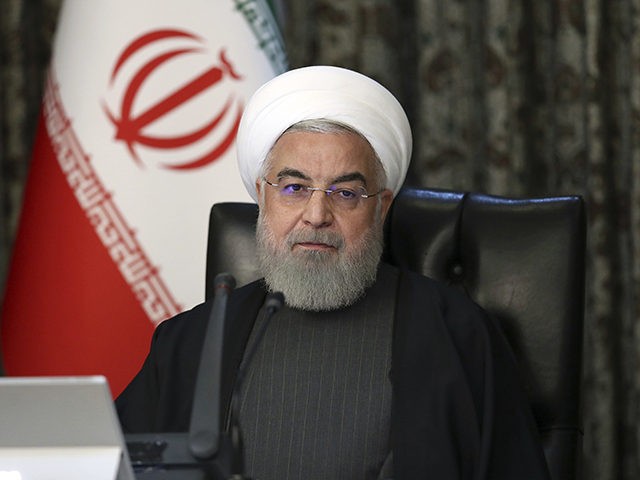Iran’s Guardian Council, the religious body that controls secular elections and determines which candidates are eligible, announced on Monday that the next presidential election will be held on June 18, 2021.
Incumbent President Hassan Rouhani is completing his second four-year term and, under Iranian election laws, he is not eligible to run for a third.
Leaving office due to term limits is the most graceful exit Rouhani could hope for, as his popularity with both the Iranian people and the theocrats who control the Iranian government is very much in doubt. Rouhani won re-election in 2017 with over 50 percent of the vote, but much of 2020 has been filled with speculation that he could be impeached and forced out of office. Supreme Leader Ayatollah Ali Khamenei shut down the impeachment effort in July and, now that the election schedule has been set by the Guardian Council, Rouhani will most likely reach the end of his second term.
Voice of America News offered a gloomy forecast for the Iranian election year:
Rouhani has been under increasing pressure from the U.S. sanctions since President Donald Trump two years ago pulled America out of the 2015 nuclear deal between Iran and world powers. The deal curbed Iran’s nuclear program in exchange for sanctions relief.
Trump also imposed severe sanctions on Iran, sending its economy into a downward spiral. Iran is now grappling also with the Trump administration’s push to impose so-called “snapback” sanctions over what Washington says is Iran’s violation of the nuclear deal.
…
Iran is also facing the Mideast region’s largest and deadliest outbreak of the coronavirus, with more than 361,000 registered cases, including 20,776 deaths.
Radio Farda noted that “unofficial campaigning for presidential election in Iran usually starts as early as the inauguration of the second term of the incumbent President,” but not this time thanks to the coronavirus, economic disaster, and constant protests against the regime.
Radio Farda nevertheless took a shot at handicapping the Iranian presidential race and came up with a few top-tier contenders, including newly-installed State Auditing Organization director Mehrdad Bazrpas, a former member of the brutal Basij militia; state television executive Ezatollah Zarghami; parliamentary speaker Mohammad Baqer Qalibaf; Parviz Fattah, head of the Mostazafan Foundation, essentially a giant development corporation styled as a religious charity; and Vice President for Scientific Affairs Surena Sattari.
Many of those top contenders are actively campaigning for the position. Most of them are presented as “young revolutionaries” who have some reform ideas, but also solid hardline credentials, usually including ties to the Islamic Revolutionary Guard Corps (IRGC), the theocratic wing of the Iranian military and one of the most powerful forces in Iranian economics.
Other possible candidates include former president Mahmoud Ahmadinejad, who is becoming the Lyndon LaRouche of Iranian politics; former parliamentary speaker Ali Larijani, the longest-serving speaker and one of the most powerful politicians in Iran, although his influence waned considerably in recent years; Vice-President Es’haq Jahangiri; and Mohsen Hashemi Rafsanjani, head of the Tehran City Council, who frequently urges Iran’s many political factions to unite against the “external enemy” of the United States.
A notable dark horse candidate is Foreign Minister Mohammad Javad Zarif, one of the best-known Iranian officials internationally and among the most respected members of Rouhani’s administration until recently, when the Iran nuclear deal failed to produce the benefits he anticipated and then the United States withdrew and reimposed sanctions.
Zarif has seemingly ruled out running for the presidency, although Radio Farda noted it is not uncommon for Iranian presidential contenders to change their minds after the elections are scheduled. Iranian election law stipulates that current officials who seek the presidency must resign from their positions three months before the election, so the firm deadline for making a decision will arrive in March.
Iranian Interior Minister Abdolreza Rahmani Fazli expressed concerns on Tuesday about the embarrassingly low turnout for parliamentary elections in February that could be repeated during the presidential race.
One of the reasons Iran’s outbreak of the Wuhan coronavirus was so widespread and deadly was the regime prodding people to ignore the pandemic and get out to vote, so turnout would not be so low; it still fell to the lowest levels in four decades. Fazli blamed low voter engagement levels in February on the pandemic but, in truth, most outside observers believe it was a deliberate show of no confidence in the Iranian government, driven by the killing of hundreds of protesters last year.
The clerical Guardian Council disqualifies most of the people who run for office in Iran, giving the theocracy a firm grip on true power. In 2020, the Guardian Council disqualified thousands of candidates for parliament, resulting in the lowest number of approved candidates in the history of the Islamic Republic and another major reason for the low voter turnout.
President Rouhani was outspokenly displeased by the high number of disqualifications, especially among reformists who might have become his political allies. Literally 99 percent of reform-minded candidates were blocked by the Guardian Council.
In the 2017 presidential election, over 1,600 people applied for candidacies but only six were approved by the Guardian Council, which struck down every female and non-Muslim applicant, along with every challenger to the Iranian political establishment. Former President Ahmadinejad was one of those disqualified after making a splashy surprise entry to the race at the last minute.

COMMENTS
Please let us know if you're having issues with commenting.